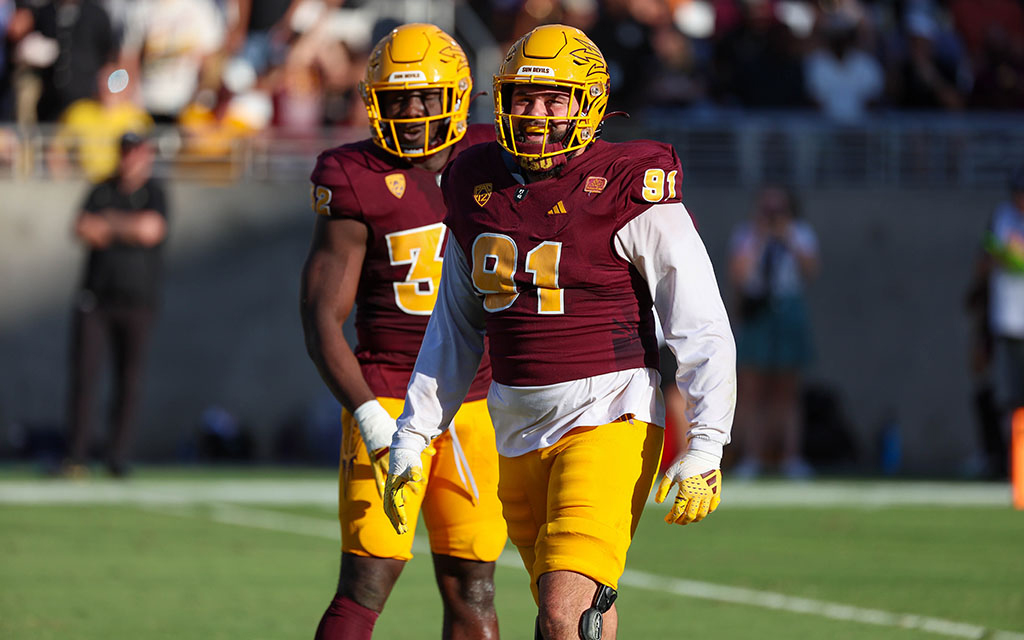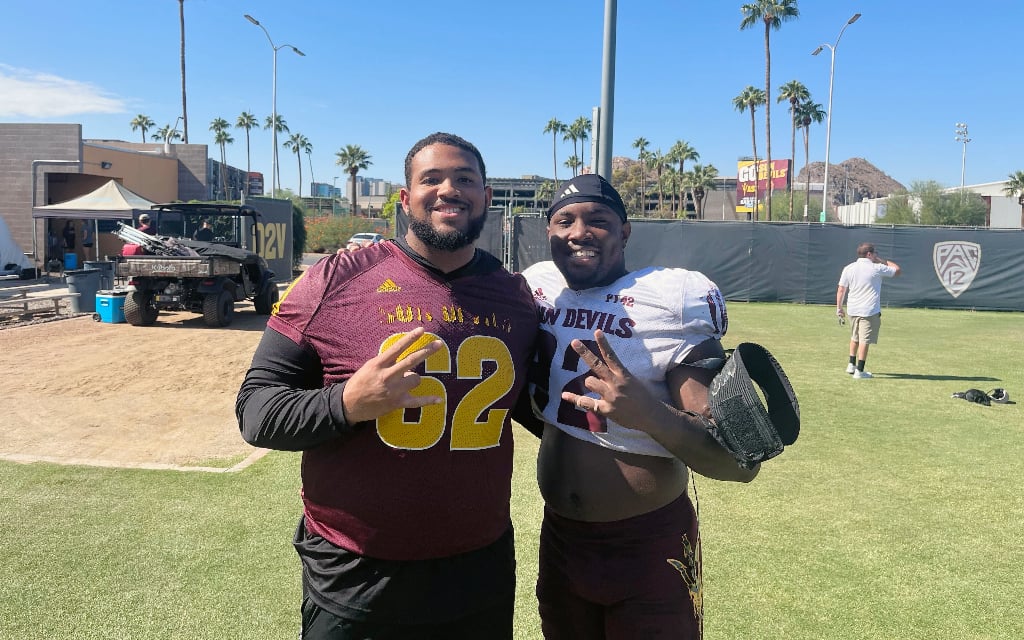
ASU football’s core group of five players, including defensive lineman Michael Matus, stand as the last remnants of the Herm Edwards era. (Photo by Reece Andrews/Cronkite News)
TEMPE – College sports programs everywhere have been through unprecedented challenges over the last five years. The COVID-19 pandemic was tremendously damaging, and the recovery process from that period is still ongoing for many universities.
However, the ASU football program has dealt with more than its fair share of issues beyond the pandemic. In three years, ASU has grappled with COVID-19 restrictions, the fallout from NCAA recruiting violations, and a midseason coaching change. All of this has taken place while the college sports landscape has been turned upside down, with the emergence of name, image and likeness (NIL) payments, as well as the increased prominence of the transfer portal.
Through all of the struggles, only five ASU football players have been with the program since the pre-pandemic days. Defensive lineman Michael Matus, cornerback Jordan Clark, wide receiver Andre Johnson, quarterback Trenton Bourguet and defensive lineman Anthonie Cooper represent the last imprints of the Herm Edwards, pre-COVID era of ASU football.
“There are not many of us left,” Matus said with a chuckle.
Matus is the longest-tenured Sun Devil on the roster, having joined the squad in 2018, during former coach Herm Edwards’ first season at ASU’s helm. After a promising freshman season in 2019, the Katy, Texas, native was a standout performer in 2020 and 2021. Matus has struggled with injuries the last two seasons, as he finishes up his final season of eligibility this fall. Currently an MBA student, Matus has had a bird’s eye view of the Sun Devils’ travails.
Matus’ freshman season in 2019 provided hope to a program that had not seen high-level success for several years. A close win over a ranked Michigan State team capped off a 3-0 start to the year, and wins over top-10 ranked Oregon, a struggling Arizona in the Territorial Cup and Florida State in the Sun Bowl clinched a 3-0 finish.
As the program prepared for the third season of the Edwards era, March 2020 brought the outset of the COVID-19 pandemic, effectively halting all college athletics through the summer.
It was not until Nov. 7, 2020 that ASU finally played its season opener, a 28-27 nail-biting loss to USC in Los Angeles. The following week began a stream of canceled games due to a COVID-19 outbreak on the team that included a positive test from Edwards.
“Half the time, we didn’t even know we were going to have practice that day. It’s kind of weird,” Matus said of the truncated COVID-19 season. “I think it was worth it enough for us to play … For as much crap as we had thrown onto our plate that year, it was fun.”
ASU finished the season 2-2, including a 70-7 Territorial Cup victory over the Arizona Wildcats, but elected not to play in a bowl game. The Sun Devils had endured the worst of the pandemic, but a myriad of challenges awaited them.
In April 2021, the NCAA’s Division I Council allowed players who intended to transfer to new schools to do so without sitting out for a full year with their new school, as was previously policy. Two months later, in a unanimous decision, the U.S. Supreme Court ruled in NCAA v. Alston that college athletes were now eligible to profit off their name, image and likeness, ending decades of strict regulations against compensation of college athletes.
Together, these two forces have created a system of pseudo-free agency in college athletics, where players can transfer from one school to another with little penalty, with the prospect of NIL payments playing a role in their decision.
Matus said transferring was never on his mind.
“I didn’t want to take my chances in (the transfer portal),” Matus said. “That was just me personally. I thought it was more of a headache than something good that could come out of it.”
While football is immensely important to him, Clark’s decision to remain with ASU stemmed from everything else that the school provides.
“I love Tempe,” said Clark, one of the core five. “Whenever I made my college decision (it was) based off where I’d be happy in my life. Football takes care of itself. So, even through all the staff changes and all the stuff that’s happened, one thing has remained constant. I enjoy where I wake up. I like being where I am.”
The son of former NFL safety Ryan Clark and an Under Armour All-American in high school, Clark has appeared in 37 games for the Sun Devils throughout five seasons. He has watched his role increase dramatically since appearing in two games during his freshman season in 2019.
Clark appeared in 11 games in 2021 and 2022, and grew into one of the best coverage corners in FBS last season. This campaign – despite being targeted 59 times, the most of any corner in the Pac-12 – , he is one of only seven corners in the conference not to allow a touchdown.
ASU’s competitiveness in the transfer portal took a hit in June 2021, when the school confirmed it was being investigated by the NCAA for allegedly hosting recruits for on-campus visits during a COVID-19-related “dead period” instituted in response to the pandemic. The investigation led to the dismissal and resignation of several assistant coaches, and may have contributed to over a dozen key players, including quarterback Jayden Daniels and wide receiver Ricky Pearsall, transferring from ASU to SEC schools.
“It gets emotionally draining focusing on it because eventually you go in circles,” Matus said of the day-to-day churn of the transfer portal. “And you know what, at the end of the day, if kids don’t want to be here, they don’t want to be here. It is what it is, you know?”
Edwards was dismissed just three games into the 2022 season, eventually replaced with Kenny Dillingham. Despite just a 3-7 start this season, there is optimism about the future of the program, with Dillingham’s focus on keeping high-level local talent in the Valley.
“I think Kenny and I think coach (Brian) Ward, defensively, they’re coming in and they’re clearly identifying a culture that we need to be,” Matus said.
Through Dillingham’s time at ASU, NIL has become increasingly critical not only for enticing recruits and transfers, but also for retaining members of the current roster and creating the conditions for more lifers like Clark and Matus.
Despite having to manage coaching changes and different defensive schemes, Clark has been able to perform at a high level consistently in his five years with the team.
“I have my own philosophy in a way,” Clark said. “The coaching philosophies are pretty similar. As long as you play hard and do what you’re supposed to do, you’ll fit right in. I kind of hold myself to a standard above what the coaches expect of me, so I’ve never run into any trouble with it.”
Dillingham said Monday that ASU’s NIL program will need to improve at a “rapid, rapid, rapid, rapid, rapid rate” to be competitive heading into this upcoming offseason.
ASU athletics may have received an NIL boom just hours before Dillingham’s pronouncement: Vice President for University Athletics Ray Anderson’s resignation. SunDevilSource reported that ASU’s Sun Angel Collective, the primary NIL collective associated with ASU, had more signups Monday for monthly donations than any other day in its history.
For the veterans of the program, this moment feels like a true turning point. Clark is confident in what the coaching staff is building for the future.
“Oh man, I see us ascending,” Clark said. “I think that this year obviously hasn’t gone how we wanted it to, but you see the trend in the right direction. I think if we just continue listening to coach Dillingham and coach Ward, we’re going to be right back where we’re supposed to be.”
With Matus’ football career coming to an end in a few weeks, the motivation for him is to be a building block for the program’s transformation.
“ASU is a sleeping giant. They just need to build something,” Matus said. “If ASU is competing in a national title in three years, four years, I could say I helped them get there. I think Kenny has started something. I think he’s woken up the giant a little bit.”



